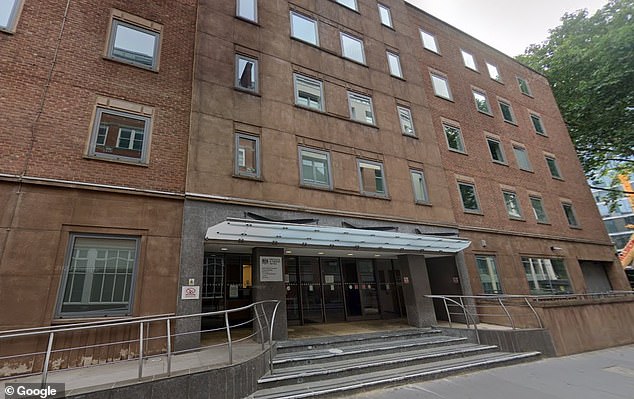A gay Malaysian asylum seeker has won the right to stay in Britain after a judge ruled his home country’s ban on Pride wrist watches showed he was at risk of persecution if sent back.
The man, who had overstayed his visa, won his case after Judge Bijan Hoshi ruled that the LGBTQ+ community are subjected to ‘serious discrimination and harassment’ by both the government and society in the Southeast Asian country.
Consensual same-sex relations remain illegal in Malaysia and can see individuals punished with sentences of up to 20 years in prison, fines and even caning. Hate crimes and extrajudicial killings are reported to often take place with impunity.
In his ruling, the judge referred to the banning of a ‘Pride collection’ of watches made by the Swiss company Swatch in 2023 as an example of how even small actions in support of the LGBTQ+ community can result in lengthy prison sentences.
The prohibition meant that any Malaysians caught wearing the rainbow-coloured timepieces in the Muslim-majority country could face a three year prison sentence.
While the Home Office initially ruled the asylum seeker, in his early 30s, should return to Malaysia, he appealed the decision and has now been granted refugee status.
The judge said it was ‘entirely plausible’ for the individual to fear persecution if he were to return to the country due to the ‘extreme hostility’ shown towards the LGBTQ+ community.
The Upper Tier Tribunal of the Immigration and Asylum Chamber was told the man – who was granted anonymity – entered the UK in November 2015 when he was around 21 years old.

In his ruling, the judge referred to the banning of a ‘Pride collection’ of watches in Malaysia made by the Swiss company Swatch in 2023
While he was granted leave to enter as a visitor for six months, it was heard that he ‘overstayed’.
In early 2018, the Malaysian national was encountered by immigration officials and he was subsequently arrested.
Later that year, he made a protection and human rights claim on the basis that he was a gay man who ‘feared’ return to Malaysia for that reason.
But, his application was refused on all grounds in 2022.
The Home Office accepted that he was gay and that there would be no ‘sufficiency of protection’ on return – but ultimately ruled that he would not face persecution and could reasonably relocate to the capital of the country, Kuala Lumpur.
This is because the area is considered more tolerant of LGBTQ+ persons.
Upon hearing the decision, the asylum seeker appealed – but this was dismissed by an immigration judge who ruled the individual would ‘choose to live discreetly in Malaysia because of societal pressure rather than fear of persecution’.
He appealed the decision again and it was decided that his case would be reheard.
The hearing before The Upper Tier Tribunal of the Immigration and Asylum Chamber took place in February of this year.
The Home Office argued that the individual had ‘failed to establish that fear of persecution would be the reason for the concealment of his sexual orientation on return’.

The man, who had overstayed his visa, won his case at court (pictured) after Judge Bijan Hoshi ruled that the LGBTQ+ community are subjected to ‘serious discrimination and harassment’ by both the government and society in the Southeast Asian country
They argued that he did not know anyone who had been arrested and detained for being gay in Malaysia and was not aware of the specific laws concerning same-sex sexual activity in the Southeast Asian country.
It was argued that his ‘claimed fear of persecution’ was ‘vague and lacking in detail’.
And, it was said that the individual had not told his housemate in the UK that he was gay for several years.
‘All of these factors indicated that the true reason for the concealment of his sexual orientation on return would be societal pressure, not fear of persecution,’ the Home Office argued.
But, lawyers representing the asylum seeker stated it was ‘irrelevant’ that he did not know anyone who had been arrested and detained for being gay in Malaysia and was not aware of the specific laws concerning same-sex sexual activity.
The man gave evidence to the fact that he was taught that same-sex sexual activity was ‘illegal’ in school and said as a Malaysian national he was ‘well-aware that it was illegal and culturally taboo’.
It was argued that it was also ‘irrelevant’ that he hadn’t told his housemate about his sexuality – as it was a ‘matter for him to choose whom to tell’.
They said the man would have a ‘well-founded fear of persecution and be at real risk of serious harm throughout Malaysia, including in Kuala Lumpur’.
Deputy Upper Tribunal Judge Hoshi said he was ‘entirely satisfied’ that the asylum seeker had ‘established to the lower standard that fear of persecution is a material reason that he would conceal his sexual orientation if he were to return to Malaysia’.
The judge said the man – who claimed his delay in claiming asylum was because he did not know he could do it on the basis of being gay – was an ‘impressive witness’ who provided ‘cogent and compelling’ evidence during the hearing.
Judge Hoshi said: ‘It is entirely plausible that the [asylum seeker] would fear persecution for being gay if he were to return to Malaysia, and would conceal his sexual orientation for that reason.
‘For now, it is sufficient to say that it makes it quite clear that the LGBTQ+ community is the subject of serious discrimination and harassment and by both the government and society at large.
‘The [Malaysian] government is extremely hostile towards the LGBTQ+ community.’
The judge referred to evidence he was told in the hearing, in which the country’s Prime Minister rejected the idea that LGBTQ+ Malaysians would be ‘recognised and protected’ under his government.
He continued: ‘We further note that, in August 2023, the government prohibited the possession of wristwatches produced as part of a Pride collection – the offence is punishable by a sentence of imprisonment of up to 3 years and a financial penalty.
‘Although it is not known whether there have been any arrests or prosecutions under this new law, we consider its introduction to be a strong indication of the government’s extreme hostility towards the LGBTQ+ community.’
In 2023, Malaysian authorities raided Swatch stores in May and seized 172 watches that celebrate LGBTQ rights.
It was reported that the authorities said the sale of such timepieces ‘may harm… the interests of the nation by promoting, supporting and normalising the LGBTQ+ movement that is not accepted by the general public’.
The judge further noted the number of offences which include the same-sex sexual activity and carry sentences of imprisonment and corporal punishment.
He spoke of the state’s ‘active harassment’ of the community in which organisers and attendees of demonstrations in support of LGBTQ+ rights are often arrested.
Judge Hoshi added: ‘On the basis of our analysis above, we do not consider that it would be safe for the [asylum seeker] to return to any part of Malaysia and live there openly as a gay man.’
They upheld his appeal under the Refugee Convention and Articles 3 and 8 of the European Convention on Human Rights.






